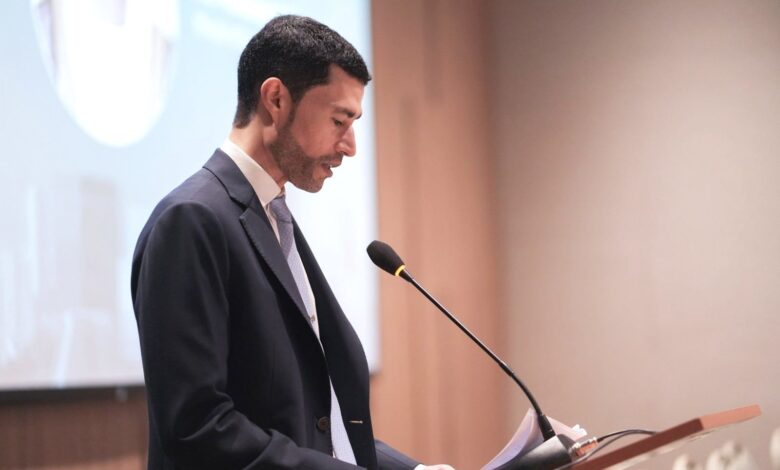
Mohamed Hadi Al Hussaini, Minister of State for Financial Affairs, has reaffirmed the UAE’s commitment to sustainable finance and collaboration with Brazil, the current Chair of G20, to achieve climate finance goals, emphasising that finance has been and is still key for enabling climate action.
Al Hussaini announced the UAE’s plan to address the financing gap by the UAE banks offering sustainable financing by 2030 and contributing to the International Monetary Fund for resilience and sustainability to support countries vulnerable to climate change. He also highlighted that the UAE is the largest contributor to the GFMR trust fund.
Al Hussaini made these remarks during his participation in the COP28-G20 Conference on Sustainable Finance, held in Rio de Janeiro, Brazil, on 24th July. The conference was part of the G20 finance ministers and central bank governors’ meetings, which was co-organised by COP28 and Brazil.
Present at the conference were Samir Sharifov, Minister of Finance, Azerbaijan; Fernando Haddad, Minister of Finance, Brazil; Marina Silva, Minister of Environment and Climate Change, Brazil; Sri Mulyani Indrawati, Minister of Finance, Indonesia; Marsha Caddle, Minister of Industry, Innovation, Science and Technology, Barbados; and senior representatives of multilateral development banks.
“During the COP28 conference, hosted by the UAE last year, a global consensus was reached on the need to limit the temperature rise to 1.5°C. This requires a fair and orderly transition away from fossil fuels, with global targets set to triple renewable energy and double energy efficiency by the end of the decade. To achieve these objectives, we will need to mobilise all sources of public, private, and charitable funding,” stated Al Hussaini at the COP28-G20.
“Realising this goal demands a shift towards climate investments and this presents an unparalleled opportunity for prosperity and economic growth. We need an international framework that supports the distribution of finance in ways that mitigate investment risks in developing countries,” Al Hussaini added.
The minister noted that the launch of the Global Climate Finance Framework at COP28 received support from many G20 member countries, commending the close collaboration with a team of high-level experts, which provided a roadmap for the necessary actions to implement this framework. He highlighted that finance ministries play a pivotal role in leading the transition towards climate investments.
Al Husseini pointed out that the G20’s review of multilateral climate funds this year, under the Brazilian presidency, is a necessary move to promote the agenda for accessible and affordable financing. “We hope that COP28 and G20 will establish a robust foundation for future COP conferences, which will be essential for propelling climate finance progress,” he added.
The conference featured discussions on creating a renewable financial structure to facilitate sustainable finance, unlocking investment opportunities for climate action, expanding concessional financing, and enabling private-sector financing. It also discussed the role of multilateral development banks in becoming more effective and mobilising financial resources for national contribution plans.
The UAE, represented by the Ministry of Finance and the Central Bank of the UAE, took part in the third G20 Finance Ministers and Central Bank Governors (G20 FMCBG) meeting.
The UAE delegation was led by Mohamed Bin Hadi Al Hussaini, Minister of State for Financial Affairs, and included Ibrahim Obaid Al Zaabi, CBUAE’s Assistant Governor of the Monetary Policy and Stability Department; Ambassador Majid Al Suwaidi, COP28 Director-General; Ali Abdullah Sharafi, Assistant Under-Secretary of the International Financial Relationship Sector at the MoF; and Thuraiya Hamed Alhashmi, Acting Director of Relations and International Financial Organisations at the MoF.
Brazil, holding the current presidency, has steered the G20’s agenda on sustainable finance through the Sustainable Finance Working Group (SFWG). The group is working to advance the implementation of the Sustainable Finance Roadmap—a comprehensive, multi-year plan designed to guide the G20’s efforts on climate and sustainable finance.
This roadmap outlines four key priorities: enhancing access to international environmental and climate funds; fostering fair, reliable, and robust transformation plans; and establishing sustainability reporting standards that accommodate the diverse needs of all stakeholders, including SMEs, developing countries, and emerging markets.
Source : Wam.ae



